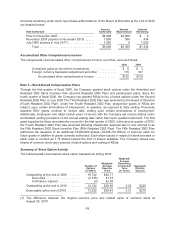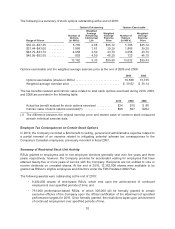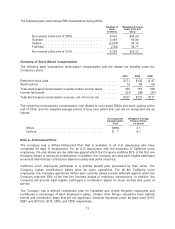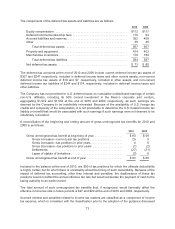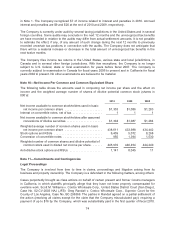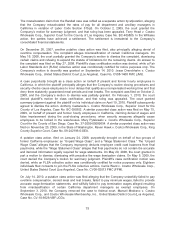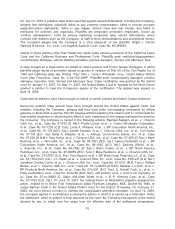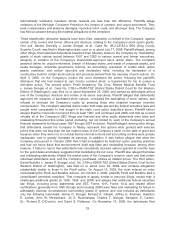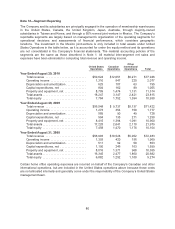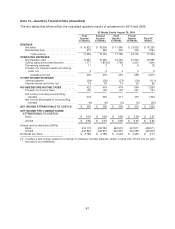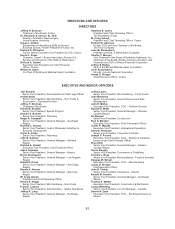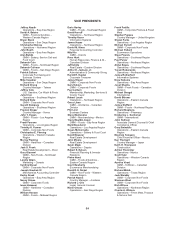Costco 2010 Annual Report Download - page 80
Download and view the complete annual report
Please find page 80 of the 2010 Costco annual report below. You can navigate through the pages in the report by either clicking on the pages listed below, or by using the keyword search tool below to find specific information within the annual report.automatically reimburse members whose rewards are less than this difference. Plaintiffs allege
violations of the Michigan Consumer Protection Act, breach of contract, and unjust enrichment. They
seek compensatory and statutory damages, injunctive relief, costs, and attorneys’ fees. The Company
has filed an answer denying the material allegations of the complaint.
Three shareholder derivative lawsuits have been filed, ostensibly on behalf of the Company, against
certain of its current and former officers and directors, relating to the Company’s stock option grants.
One suit, Sandra Donnelly v. James Sinegal, et al., Case No. 08-2-23783-4 SEA (King County
Superior Court), was filed in Washington state court on or about July 17, 2008. Plaintiff alleged, among
other things, that individual defendants breached their fiduciary duties to the Company by “backdating”
grants of stock options issued between 1997 and 2005 to various current and former executives,
allegedly in violation of the Company’s shareholder-approved stock option plans. The complaint
asserted claims for unjust enrichment, breach of fiduciary duties, and waste of corporate assets, and
seeks damages, corporate governance reforms, an accounting, rescission of certain stock option
grants, restitution, and certain injunctive and declaratory relief, including the declaration of a
constructive trust for certain stock options and proceeds derived from the exercise of such options. On
April 3, 2009, on the Company’s motion the court dismissed the action, following the plaintiff’s
disclosure that she had ceased to own Costco common stock, a requirement for her to pursue a
derivative action. The second action, Pirelli Armstrong Tire Corp. Retiree Medical Benefits Trust
v. James Sinegal, et al., Case No. 2:08-cv-01450-TSZ (United States District Court for the Western
District of Washington), was filed on or about September 29, 2008, and named as defendants all but
one of the Company’s directors and certain of its senior executives. Plaintiff alleged that defendants
approved the issuance of backdated stock options, concealed the backdating of stock options, and
refused to vindicate the Company’s rights by pursuing those who obtained improper incentive
compensation. The complaint asserted claims under both state law and the federal securities laws and
sought relief comparable to that sought in the state court action described above. Plaintiff further
alleged that the misconduct occurred from at least 1997, and continued until 2006, and that as a result
virtually all of the Company’s SEC filings and financial and other public statements were false and
misleading throughout this entire period (including, but not limited to, each of the Company’s annual
financial statements for fiscal years 1997 through 2007 inclusive). Plaintiff alleged, among other things,
that defendants caused the Company to falsely represent that options were granted with exercise
prices that were not less than the fair market value of the Company’s stock on the date of grant and
issuance when they were not, to conceal that its internal controls and accounting controls were grossly
inadequate, and to grossly overstate its earnings. In addition, it was further alleged that when the
Company announced in October 2006 that it had investigated its historical option granting practices
and had not found fraud that announcement itself was false and misleading because, among other
reasons, it failed to report that defendants had consistently received options granted at monthly lows
for the grant dates and falsely suggested that backdating did not occur. Plaintiff also alleged that false
and misleading statements inflated the market price of the Company’s common stock and that certain
individual defendants sold, and the Company purchased, shares at inflated prices. The third action,
Daniel Buckfire v. James D. Sinegal, et al., No. 2:09-cv-00893-TSZ (United States District Court for the
Western District of Washington), was filed on or about June 29, 2009, and contains allegations
substantially similar to those in the Pirelli action. On August 12, 2009, the court entered an order
consolidating the Pirelli and Buckfire actions. On October 2, 2009, plaintiffs Pirelli and Buckfire filed a
consolidated amended complaint. That complaint is largely similar to previous filings, except that: it
challenges additional grants (in 1995, 1996, and 2004) and alleges that additional federal securities
law filings, including proxy statements and SEC Forms 10-K, Forms 10-Q and related officer
certifications (generally from 1996 through and including 2008) were false and misleading for failure to
adequately disclose circumstances surrounding grants of options; and now includes as defendants
only the following individuals: James D. Sinegal, Richard A. Galanti, Jeffrey H. Brotman, Hamilton
E. James, John W. Meisenbach, Jill S. Ruckelshaus, Charles T. Munger, Benjamin S. Carson,
Sr., Richard D. DiCerchio, and David S. Petterson. On November 16, 2009, the defendants filed
78



